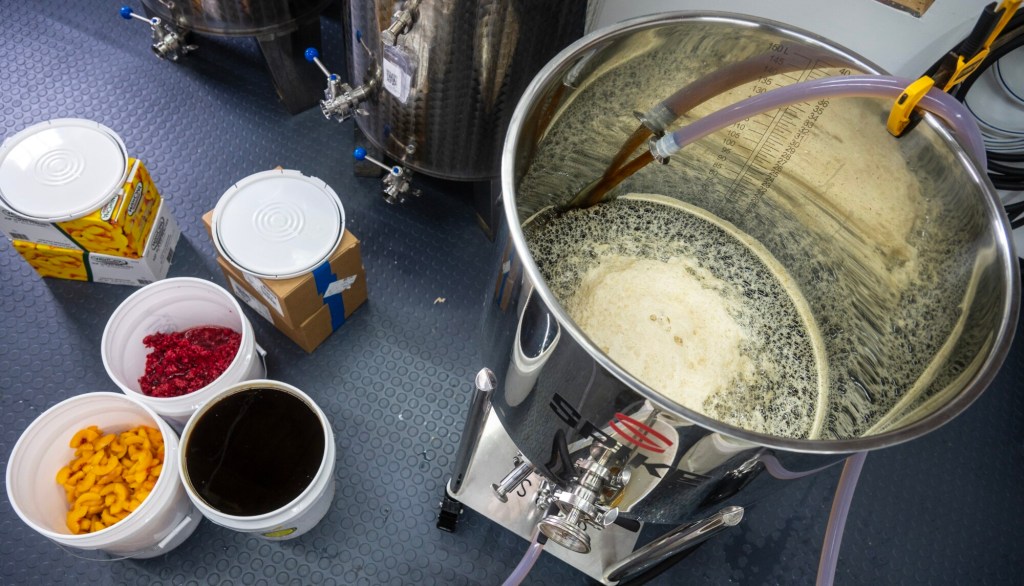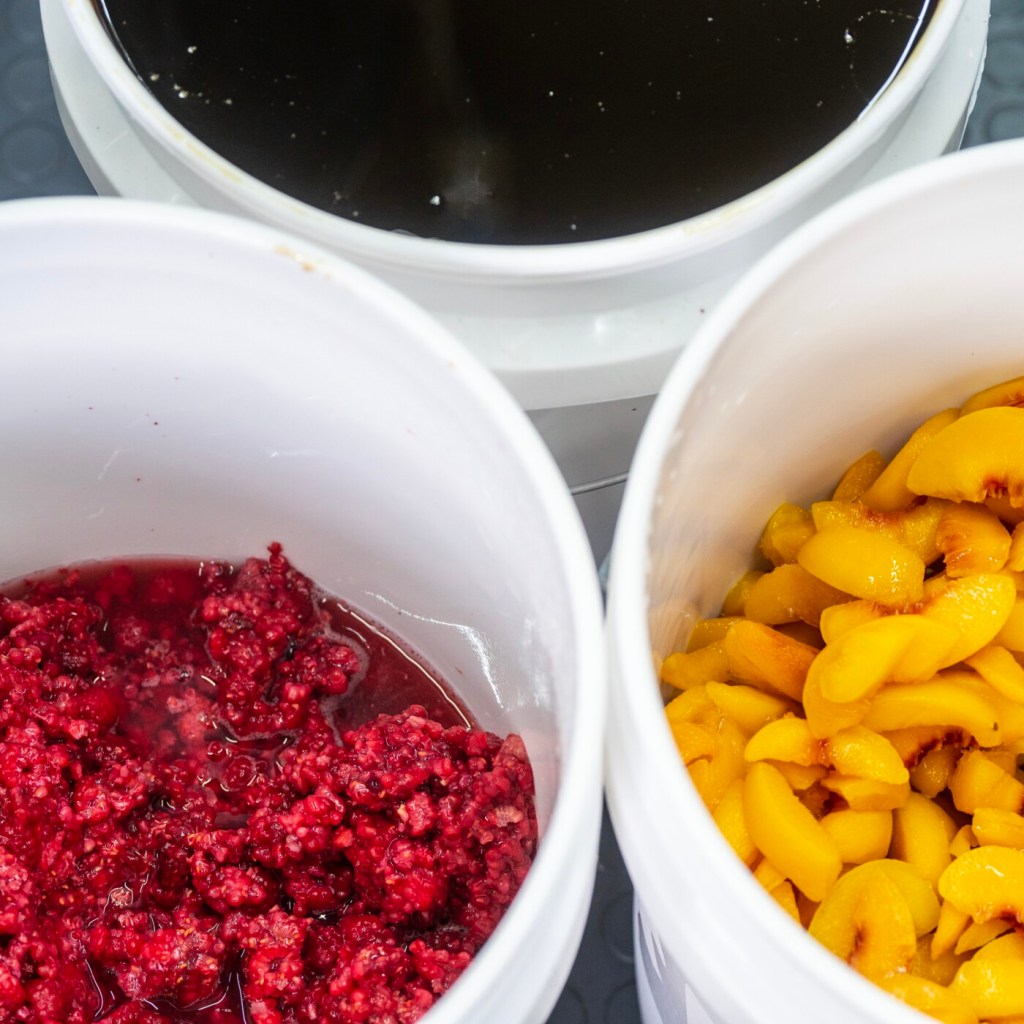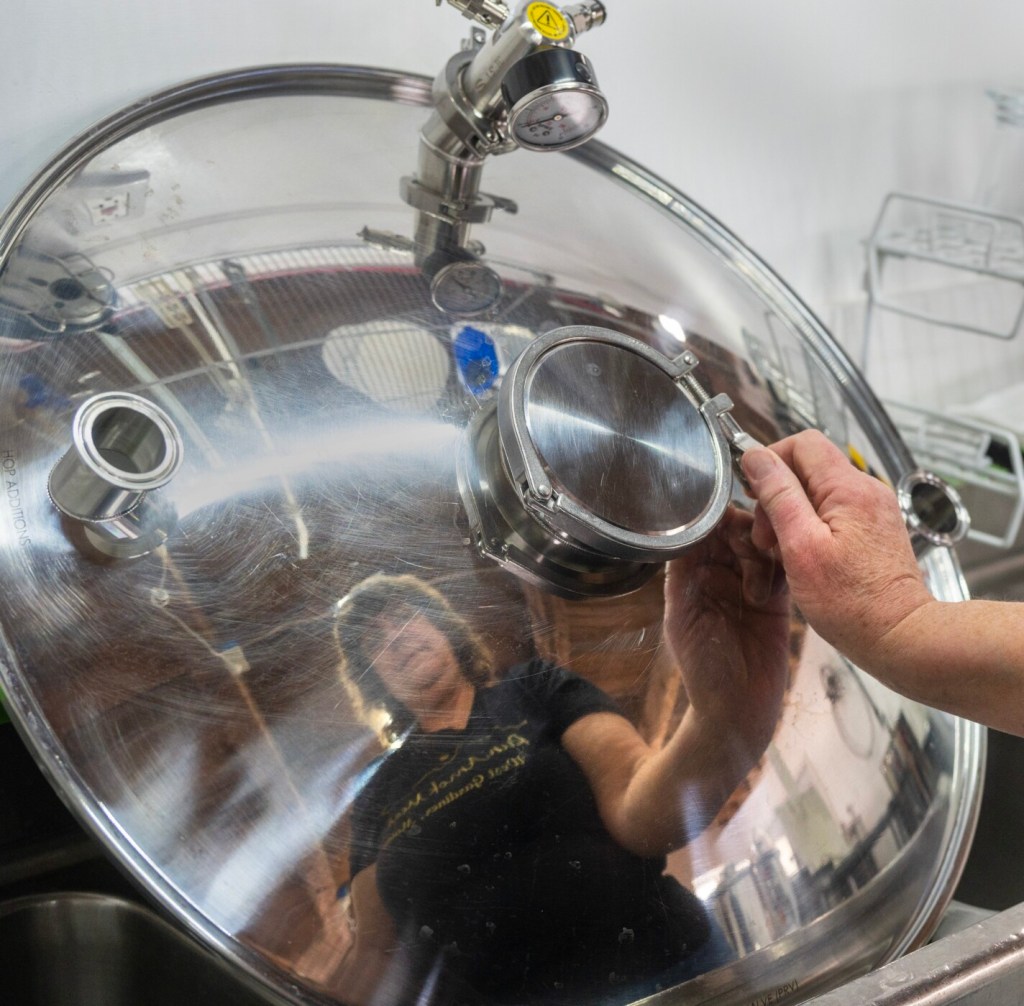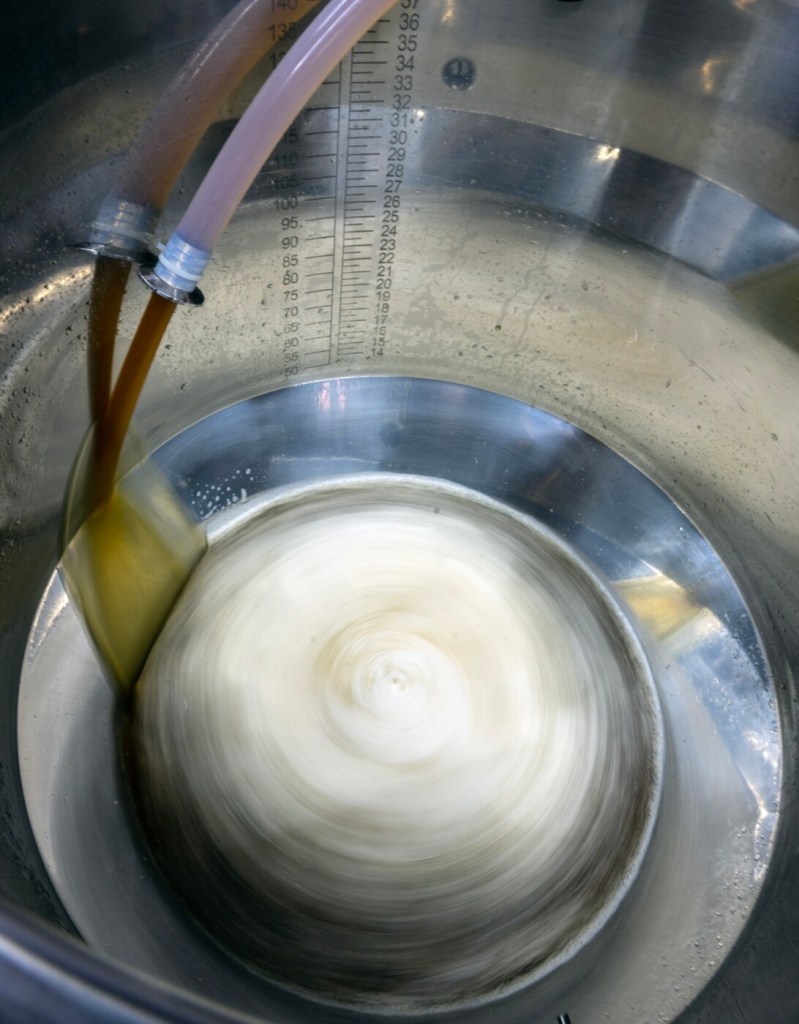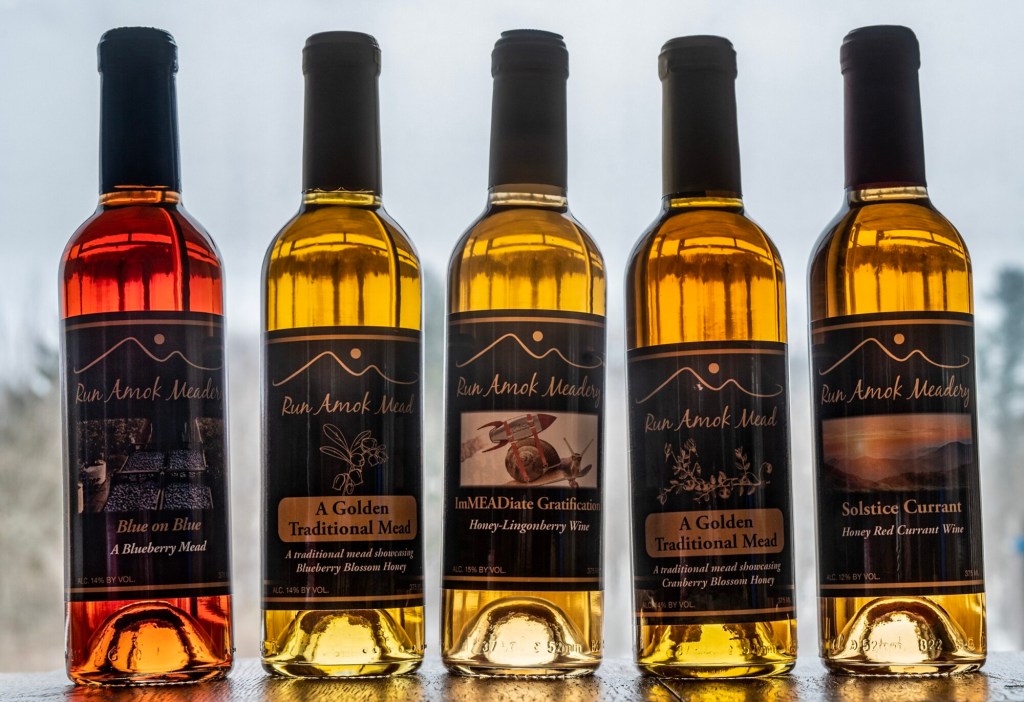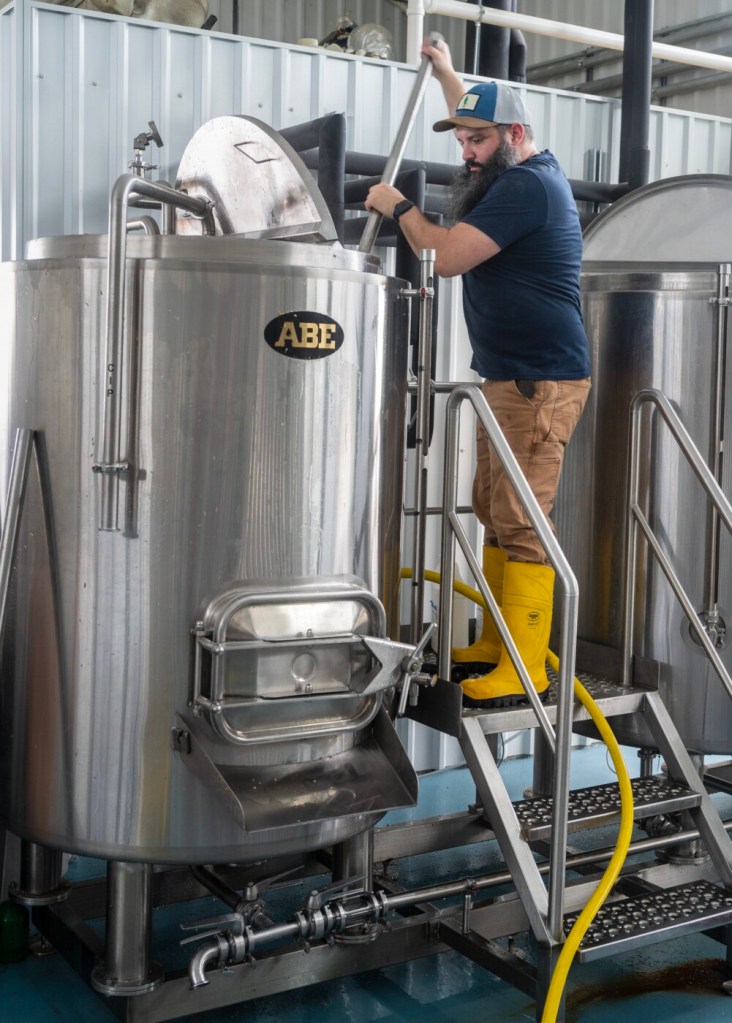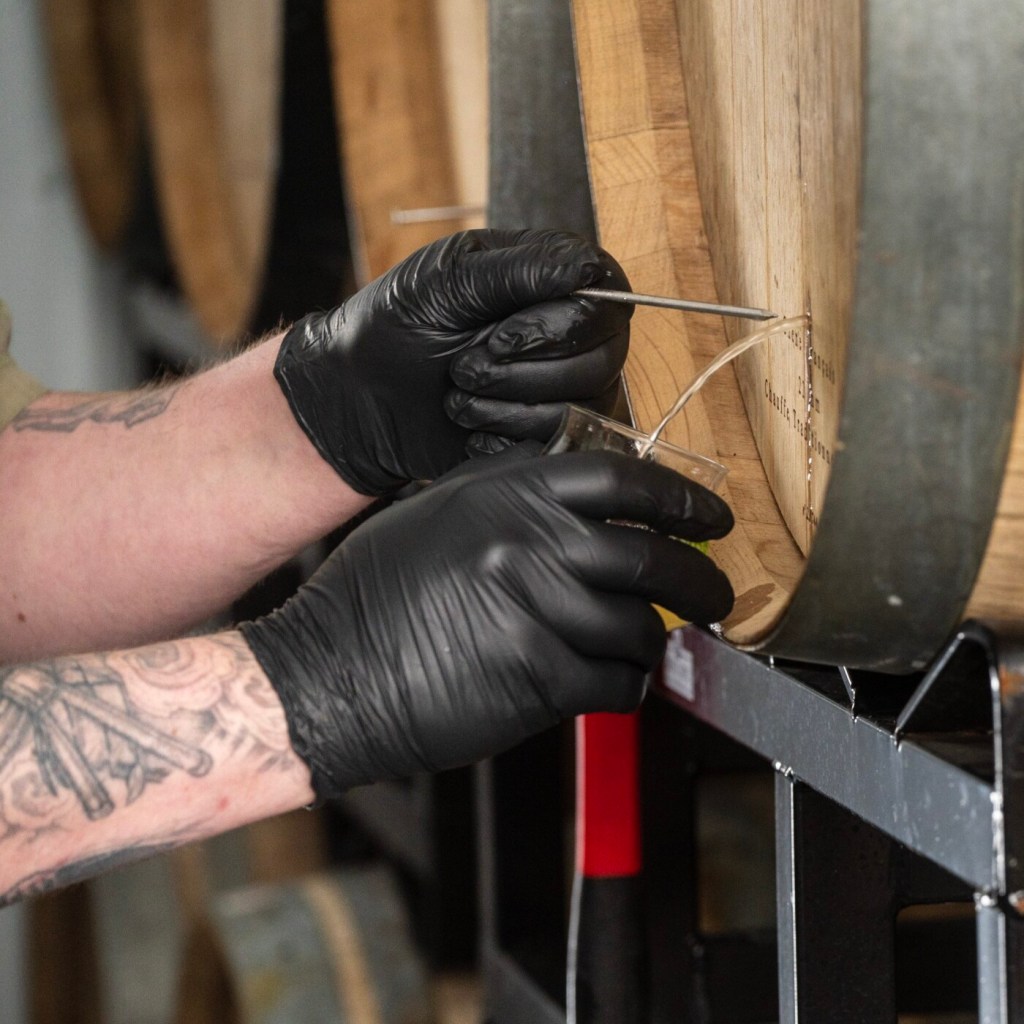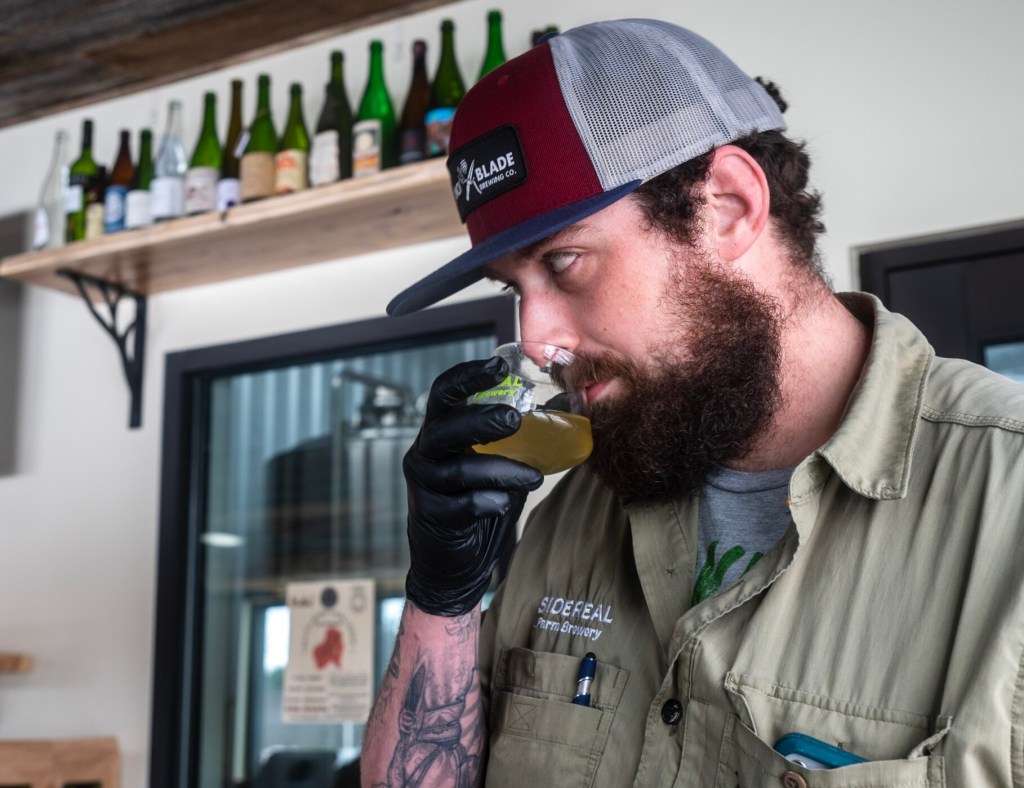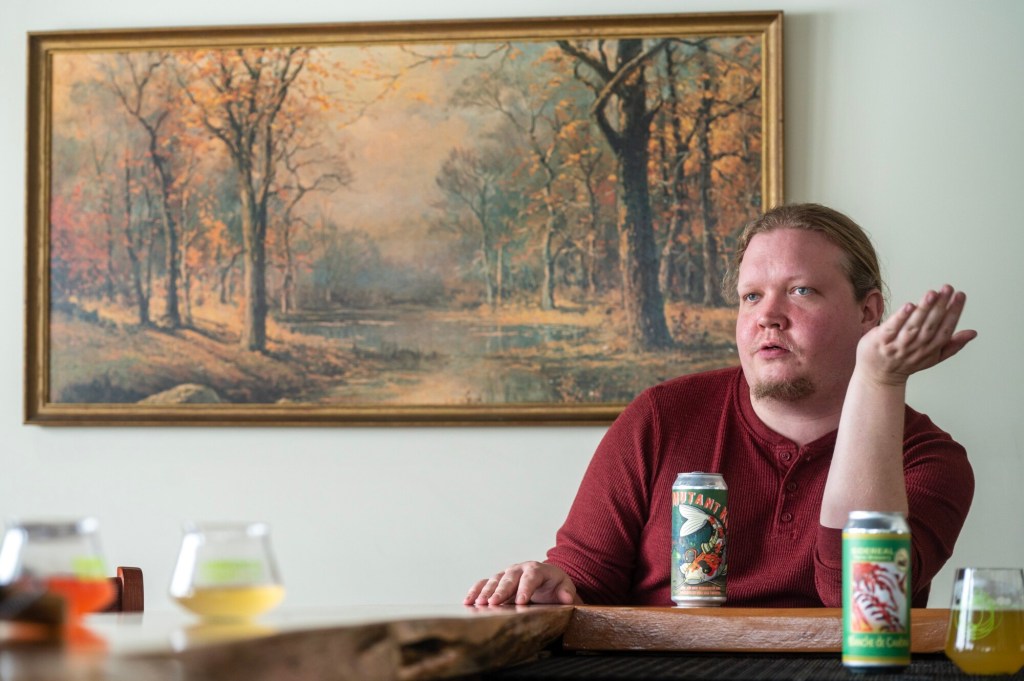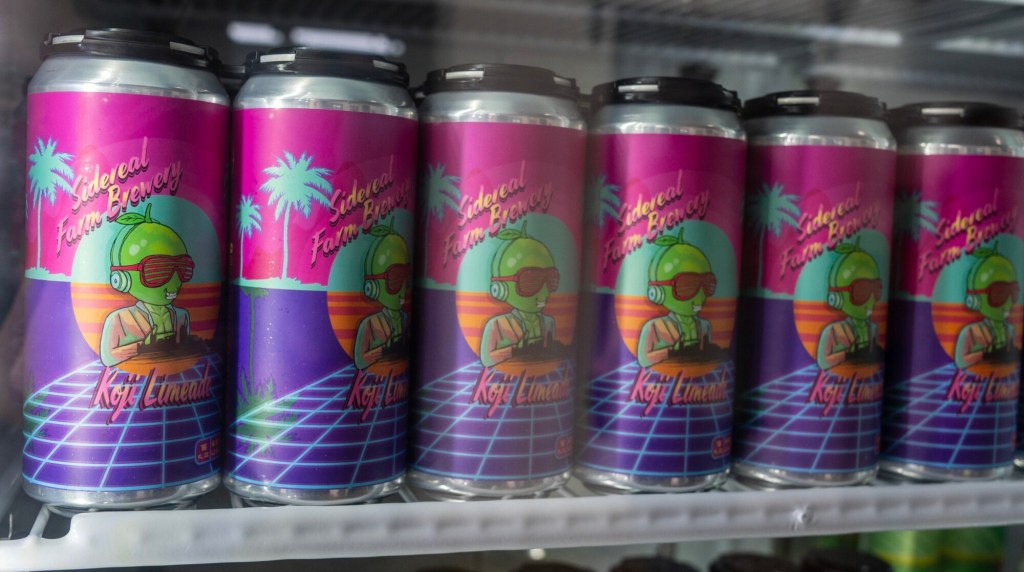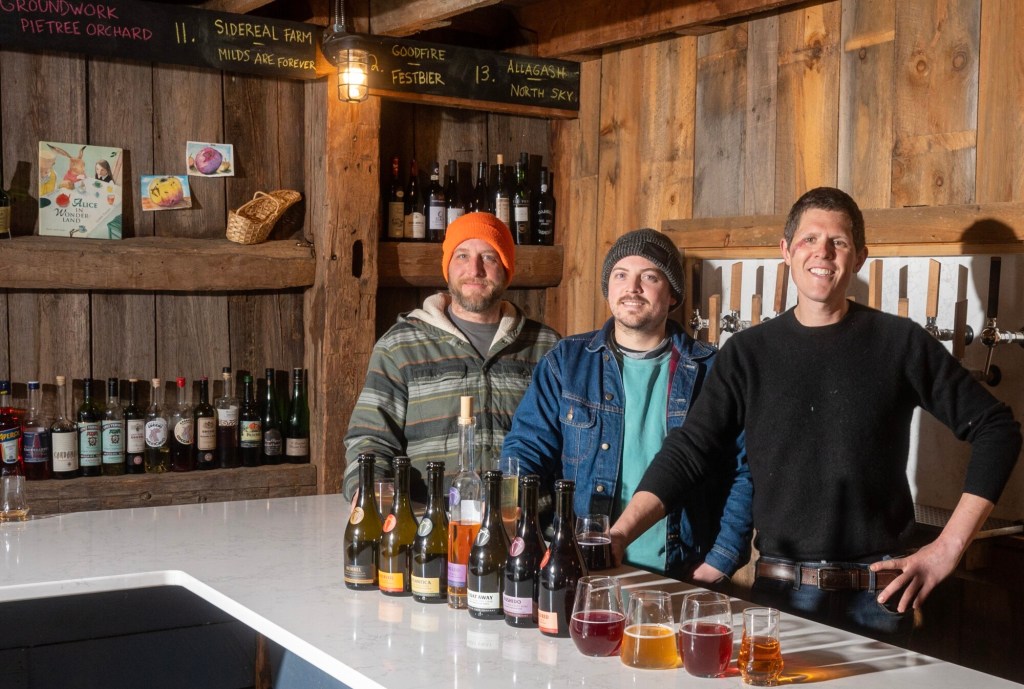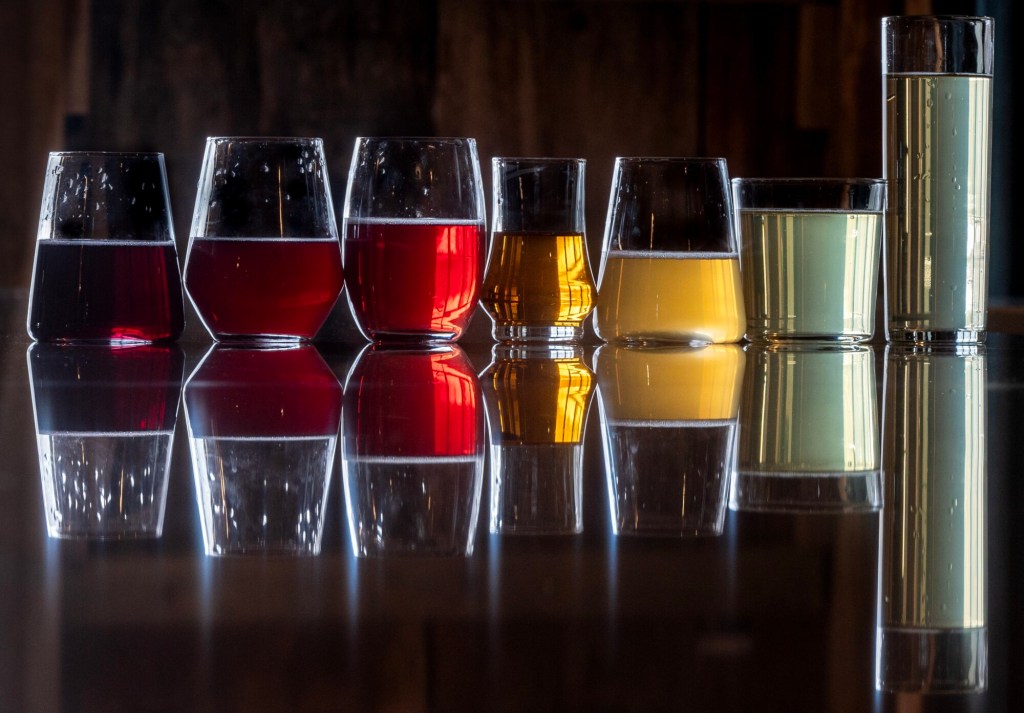WINTHROP — Maine’s late winter is often a slack time for many, as fields and trees lie dormant, often under a blanket of snow.
But for three different craft beverage businesses across central Maine, the days leading up to the seasonal change to spring have been anything but slow as they prepare for warmer weather and the business that it brings.

Justin Amaral, executive chef and director of brewing operations, pokes a stainless steel nail back into the barrel after pouring a sample of a chardonnay wine and beer hybrid during a recent tour at Sidereal Farm Brewery in Vassalboro. Joe Phelan/Kennebec Journal
Absolem Cider Co. in Winthrop, Run Amok Mead in West Gardiner and Sidereal Farm Brewery in Vassalboro are taking raw materials like grains, fruit and honey and experimenting to make their own mark in Maine’s expanding craft beverage or farm-to-glass industry.
“It’s not just ales and lagers any more,” said Sean Sullivan, executive director of the Maine Brewers’ Guild. “The options when you walk into a brewery or any other beverage producers are intended to engage a more diverse audience.”
As he has toured the state to visit breweries, Sullivan said, he’s found that craft beverage enterprises have taken root in areas that are not on the tourist maps, and they have been the start of communities that draw in people for various reasons.
“People feel passionate about their own little nook in Maine, and when they create these experiences, it’s kind of a beacon or a waypoint,” he said.

Owners Kevin Sturtevant, left, Zack Kaiser and Ryan Travers pose behind the bar at Absolem Cider Company in Winthrop. Joe Phelan/Kennebec Journal
Kevin Sturtevant, Zack Kaiser and Ryan Travers opened Absolem Cider in June 2022, on a 50-acre farm not far from the western shore of Cobbossee Lake and just down the road from where tradition has it that the area’s first apple trees were planted.
By then, Sturtevant and Travers had already invested several years searching out a location for their project about an hour outside of Portland that would give them enough space to build their business.

And when they opened their tasting room in the repurposed barn at the start of summer they hit the ground running.
“It was like we were finishing up the wings as we were taking off,” Sturtevant said. “It allowed us to start admittedly stronger than I would’ve ever expected, but at the same time a little slower than we would have if we’d done some marketing blitz.”
They have taken as their base the centuries-old tradition of making hard cider, and they incorporate wine-making techniques — and add wine — to create a wide range of seasonal offerings that they serve, along with beers from other local brewers and cocktails.
“We sell to a lot of bars in Portland, some are focused on a craft beer and some on natural wine, and our type of cider lives in both of those spaces,” Kaiser said. “It’s kind of fun that we’re in both these worlds.”
At Run Amok, Christy Hemenway’s introduction to mead came from friends in her motorcycle group who made the honey wine and served it. But she didn’t start making it herself until she came across a mead-making class in North Carolina, where she was living at the time, and she was hooked.
“I’m like: I can see where I’m going with this, because I really want to do this,” she said, sitting near the wood stove in her West Gardiner living room, with her finches chirping in the next room. “It was like hitting a switch.”
When it was clear she wasn’t fated to stay in North Carolina, Hemenway and her husband returned to Maine. They found a house and property in West Gardiner that had space for a fermentation room and a barn for a tasting room.

Christy Hemenway is seen in a reflection as she clamps hardware onto the lid of a conical fermenter recently at Run Amok Mead in West Gardiner. Joe Phelan/Kennebec Journal
They moved in October 2021, renovations started in January and by mid-May 2022, she had started her first batch in her new home.
While mead — made from fermented honey — has been made for millennia, Hemenway is making it her own by adding fruits and flavors like currants or juniper berries to different kinds of honey, like blueberry blossom or cranberry blossom or even knotweed. The results have been award-winning at a wide range of competitions.
In October, she celebrated the grand opening of Run Amok Mead.
October was also the month that, after years of planning, Sidereal Farm Brewing opened its doors on a 22-acre farm that David D’Angelo’s family has owned since 2009. It has been a farm for generations.

Honey and hot water are pumped into a conical fermenter recently at Run Amok Mead in West Gardiner. Joe Phelan/Kennebec Journal
The enterprise emerged when common interests in brewing, experimentation, the land and valuing a sense of place converged, bringing together D’Angelo as chief operations officer, Justin Amaral as director of brewing operations and executive chef, and Kris Rolleston as lead brewer.
“Any one of us could have had our own breweries,” D’Angelo said. “I have one, but I’d much rather do it with these guys.”
Now, at the farm they make beer, wild wine, cider, mead and sake and offer upscale dining on-site at Maillard Kitchen, which is currently open Friday through Sunday.
The collaboration sometimes means individual pursuits are set aside for a while.
“Some of those things we just can’t do. And to try (and) make sure everybody is fulfilled from a professional perspective isn’t always the easiest thing to do,” D’Angelo said. “But we all know our purpose is the same.”

Kevin Sturtevant opens a door to the work rooms made from metal shipping containers while leading a tour recently at Absolem Cider Company in Winthrop. Joe Phelan/Kennebec Journal
The diversification in the state’s craft beverage industry is likely to continue, said Sullivan, of the Maine Brewers’ Guild, as makers tend to be industrious and try out different things.
“These are people who are finding a path to carve out a modest living in the exact place where they want to be,” he said. “And that’s a cool thing.”
And that’s reflected in the plans of these craft beverage makers as they look ahead, both to this summer season and beyond.
Hemenway coordinates mead-making with the full and new moons, in part so she has a production schedule, but it’s also a way to incorporate her spiritual beliefs, which are nature-based.
Her production capacity is about 600 cases a year. As a self-distributor, she puts on tastings at shops around the region, and she has hit the road to introduce her meads to bar and store owners in ski country and elsewhere.
“Then a beautiful thing started to happen,” she said. “I got an email saying, ‘Hey, I’d never heard of you before, why don’t you bring me some of your stuff?’ It was RSVP in Portland, and that’s what made me go to Portland. I didn’t think I was ready for Portland.”
She’s considering offering up her barn as a rustic wedding venue, and she can also see moving her fermentation facility into the building and possibly adding an Airbnb space.
And she’d like to find a distributor who is genuinely interested in her mead.
“Right now, I’m a 600-case-a-year girl,” she said. “That’s my capacity, and we can grow it. If you can show me you’ll keep selling my stuff, I’ll keep making more.”

Justin Amaral, executive chef and director of brewing operations, smells a sample of a chardonnay wine sour beer hybrid he just took from the barrel during a recent tour at Sidereal Farm Brewery in Vassalboro. Joe Phelan/Kennebec Journal
D’Angelo of Sidereal Farm Brewing said his “mission statement for everybody this year is back to the land. We’re really going to lean into it. This is the first season where we’re able to go from the beginning of the season to the end.”
“And the kitchen’s using all of it,” Amaral said.
“Everything we do has to be about this piece of dirt, and if it’s not about making this piece of dirt better, I don’t want to hear it,” D’Angelo said.
The sentiment is the same in Winthrop, as the partners at Absolem contemplate their upcoming season. They’ll expand their hours from weekends only now to Thursdays through Sundays and bring back food trucks to augment the snacks they can offer as a tasting room.
And they will continue to look at how they grow into their space and expand their vision.
“The things that I think about with our company are (about) intentionality,” Sturtevant said. “We do this because we love it. We don’t want to do anything else. We worked super hard to get here and we’re just starting. We’re looking forward to staying on the path.”
Send questions/comments to the editors.


